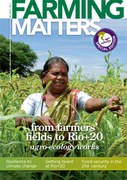We do not know yet what the outcome of Rio+20 will be. But the preparations have already triggered a tremendous stream of information about smalls-scale family farming and agro-ecology – even if this is coming mainly from the civil society side.
More than ever before, evidence is piling up to support the claim that agro-ecological systems are productive, resilient and sustainable. Yet the inability to see the strengths of family farming continues to be widespread. As a result, the future of many farming communities around the world is under unprecedented threat. How do we cross the river? It is to be hoped that the discussions in Rio will focus on how we can promote the transition to more sustainable food systems, rather than on whether we should promote such systems. There is a widespread feeling that there is no time to lose, but we should be careful not to let this sense of urgency lure us into the trap of seeking technological quick fixes, often presented as the only option to feed the world by 2050.
Back in 1992 our magazine (then called the ILEIA Newsletter) featured articles about the very same issues that we are discussing today. Food sovereignty was a key theme. La Via Campesina had not yet coined the term, but the ideas were very much there, in the minds of farmers and the authors of the articles in our magazine. Holistic resource management, increased synergy between pastoralists and farmers, and the strengthening of local seed systems were advocated as crucial strategies to beat desertification. So what’s new in our contributions to the climate change debate? The energy issue (which form of energy to use – fossil, human or bio?) was also squarely on the agenda and the expert knowledge of women farmers was acknowledged.
Twenty years later, there is an abundance of successful experiences, yet often these experiences have remained localised. Up-scaling has been a major challenge and continues to be so. One important reason for this is that agricultural policies continue to encourage farming that is dependent upon external inputs and technologies. But there are examples of sustainable farming approaches that have truly been up-scaled; think of the System of Rice Intensification, first developed in Madagascar in the 1980s. We published an article about it in 1999, and many positive reactions came from readers who tried it out for themselves. SRI is now practiced by millions of farmers in around 50 countries. There are well-documented claims that it leads to a doubling of yields and to a halving in the use of water. Yet, many rice scientists continue to question this method. Why?
There are profound changes happening that are barely visible, escaping our eyes. Let’s open our eyes more widely and be perceptive to a myriad of changes that form part of a much bigger and unstoppable process. This process, triggered by family farmers and their organisations, represents a coherent response to the deep agrarian crisis generated by the agroindustrial model.
We dedicate this Rio+20 special edition to all those farmers around the world who have made the shift to ecologically sound agriculture, to those who are making the shift, and those who want to make it. This issue is a joint production of the AgriCultures Network: our editors from Brazil, Peru, Senegal, India and the Netherlands have tried to present the most inspiring stories from around the world. We hope you will enjoy reading them, in Rio and at home!
Text: Edith van Walsum
Director, ILEIA

